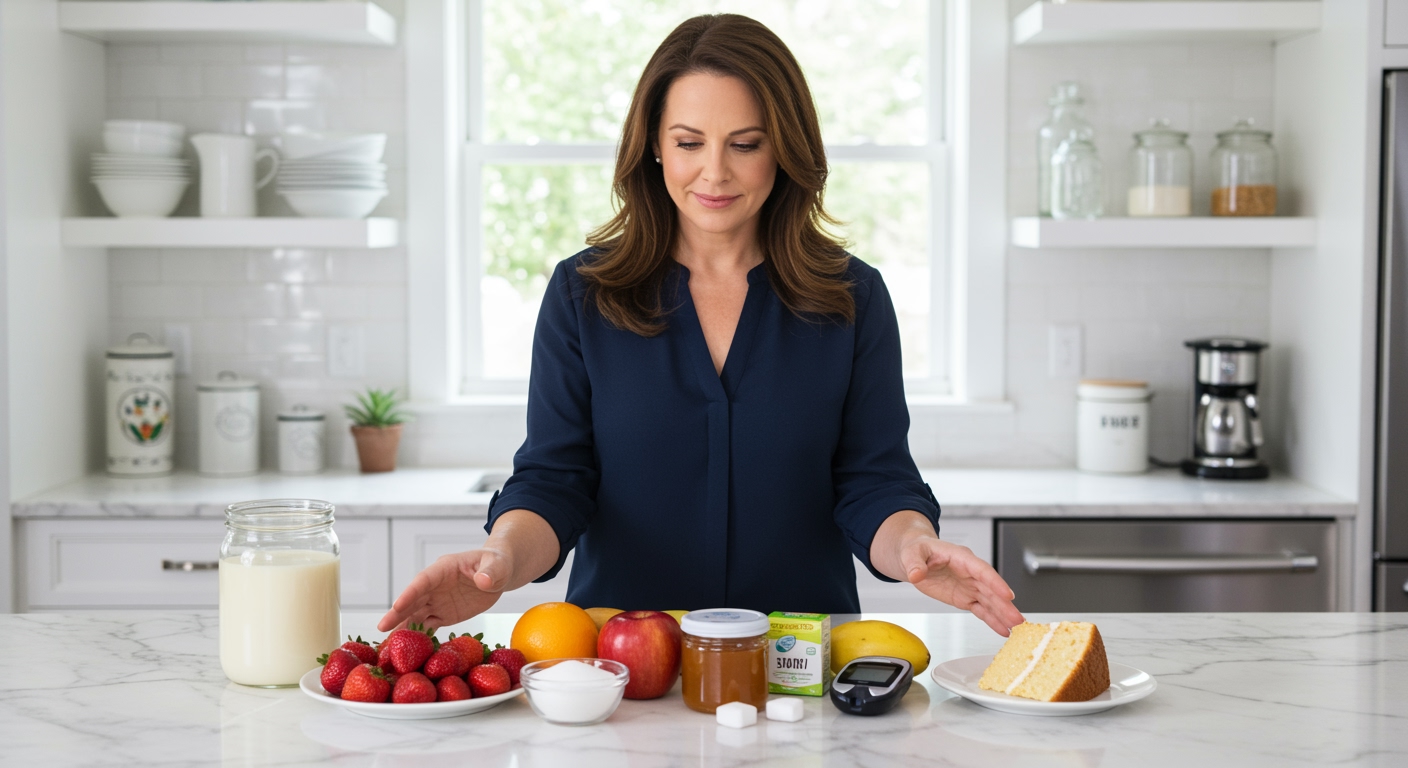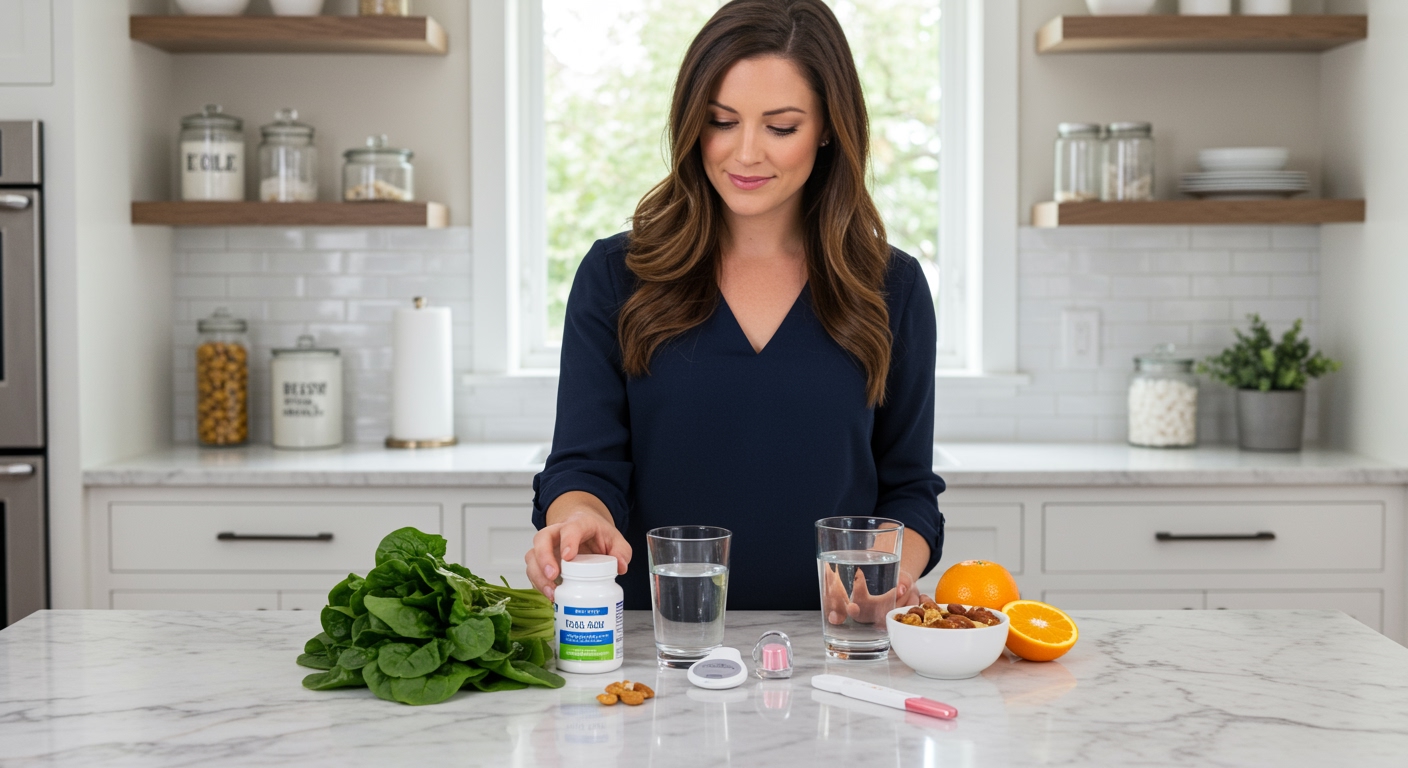✪ Key Takeaway: Sugar is not completely off-limits with PCOS, but the type and timing matter significantly for hormone balance.
Introduction
Your doctor just diagnosed you with PCOS and suddenly everyone tells you to cut out all sugar forever.
You might be asking this question because conflicting advice about sugar and PCOS leaves you confused about what you can actually eat.
Hi, I am Abdur, your nutrition coach and today I am going to explain the real truth about sugar consumption with PCOS diagnosis.
What Happens When You Have PCOS and Eat Sugar?
PCOS creates a condition called insulin resistance where your cells cannot properly use the hormone insulin.
When you eat sugar, your blood glucose levels rise and your pancreas releases insulin to help cells absorb this glucose.
With insulin resistance, your cells ignore insulin signals and glucose stays elevated in your bloodstream longer than normal.
Your pancreas responds by producing even more insulin, creating a cycle of high insulin levels throughout your body.
These elevated insulin levels trigger your ovaries to produce excess androgens like testosterone.
High androgen levels cause the classic PCOS symptoms including irregular periods, acne, and unwanted hair growth.
✪ Fact: About 70% of women with PCOS have insulin resistance, making sugar management crucial for symptom control.
Are All Types of Sugar the Same for PCOS?
Not all sugars affect your body the same way when you have PCOS.
Natural sugars found in whole fruits come packaged with fiber, vitamins, and minerals that slow absorption.
The fiber in fruits helps prevent rapid blood sugar spikes by slowing down how quickly your body absorbs the fructose.
Added sugars in processed foods like cookies, sodas, and candy hit your bloodstream much faster without any protective nutrients.
These refined sugars cause dramatic insulin spikes that worsen PCOS symptoms more than natural fruit sugars.
High fructose corn syrup, commonly found in processed foods, particularly disrupts metabolism and increases insulin resistance.
Even artificial sweeteners can trigger insulin responses in some women with PCOS, though the research remains mixed on this topic.
✪ Pro Tip: Choose berries over tropical fruits as they contain less natural sugar and more antioxidants for better PCOS management.
When Is the Best Time to Eat Sugar With PCOS?
Timing your sugar intake can significantly impact how your body responds when you have PCOS.
Your insulin sensitivity naturally varies throughout the day, being highest in the morning and lowest at night.
Eating fruits or small amounts of natural sugars earlier in the day allows your body to use that glucose more effectively.
Consuming sugar after exercise creates an optimal window when your muscles readily absorb glucose without requiring as much insulin.
Pairing sugar with protein or healthy fats further slows absorption and prevents dramatic blood sugar swings.
Late evening sugar consumption tends to cause the most problems because insulin sensitivity decreases and metabolism slows down.
✪ Note: The 30-minute window after strength training is when your muscles can absorb sugar most efficiently without insulin spikes.
How Much Sugar Can You Actually Have With PCOS?
The amount of sugar you can tolerate with PCOS depends on your individual insulin sensitivity and overall health status.
Most nutrition experts recommend limiting added sugars to no more than 25 grams per day for women with PCOS.
This equals about 6 teaspoons of added sugar, which many people exceed with just one sweetened beverage.
Natural fruit sugars do not need to be as strictly limited because they come with beneficial nutrients and fiber.
Two to three servings of whole fruits per day typically provide manageable amounts of natural sugar for most women with PCOS.
Your personal tolerance may vary based on your weight, activity level, medication use, and severity of insulin resistance.
Monitoring your blood sugar responses with a glucose meter can help you determine your individual sugar tolerance levels.
✪ Fact: One 12-ounce soda contains about 39 grams of added sugar, exceeding the entire daily recommended limit for PCOS.
What Are the Best Sugar Alternatives for PCOS?
Several natural sweeteners provide better options than refined sugar for women managing PCOS symptoms.
Stevia, derived from the stevia plant, does not raise blood sugar levels and may even improve insulin sensitivity.
Monk fruit sweetener contains natural compounds called mogrosides that provide sweetness without affecting glucose or insulin.
Small amounts of raw honey or pure maple syrup offer trace minerals and antioxidants while still requiring careful portion control.
Erythritol and xylitol are sugar alcohols that have minimal impact on blood sugar but may cause digestive issues in some people.
Fresh or frozen fruits remain the best way to satisfy sweet cravings while providing essential nutrients and fiber.
Cinnamon can enhance the natural sweetness of foods while potentially improving insulin sensitivity in women with PCOS.
✪ Pro Tip: Start with half the amount of any sugar substitute as most are significantly sweeter than regular sugar.
The Bottom Line
Sugar is not completely forbidden with PCOS, but smart choices about type, timing, and quantity make all the difference for your hormone balance.
Health is not about perfection, but about making better choices most of the time.
I would love to hear about your experiences with sugar and PCOS management, so please share your questions or thoughts in the comments below.
References
At NutritionCrown, we use quality and credible sources to ensure our content is accurate and trustworthy. Below are the sources referenced in creating this article:
- Mayo Clinic: PCOS – Symptoms and causes
- Cleveland Clinic: PCOS Diet
- Allara Health: PCOS and Sugar: Every Single Thing You Want to Know
- PCOS Nutrition: Sugar





